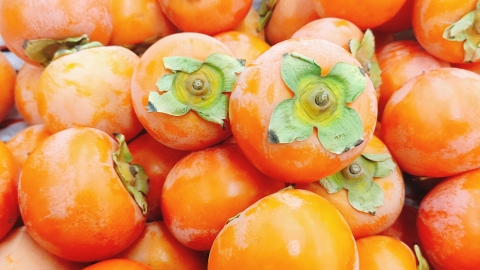What foods should not be consumed with persimmons?
Generally speaking, there are no absolute foods that cannot be consumed with persimmons. However, it is not recommended to consume large amounts of persimmons together with crabs, lamb, sweet potatoes, spinach, hawthorns, and other similar foods. Detailed explanations are as follows:
1. Crabs
Crabs are rich in high-quality protein and have a cold nature, while persimmons contain a significant amount of tannic acid and are also cold in nature. When consumed in large quantities together, the tannic acid in persimmons may combine with the protein in crabs in the stomach, forming a coagulated substance that is difficult to digest, thus increasing the burden on the gastrointestinal tract and potentially causing discomfort such as abdominal distension and pain. Additionally, the combined cold nature may intensify internal coldness, particularly affecting individuals with weaker digestive systems. Therefore, it is not recommended to consume large quantities together.

2. Lamb
When consumed in large amounts with lamb, the tannic acid in persimmons can react with the protein in meat, forming precipitates that are difficult to digest. These precipitates may remain in the gastrointestinal tract, affecting digestion and absorption, potentially causing nausea, vomiting, or difficulty in defecation, which is detrimental to gastrointestinal health. Thus, it is best to avoid consuming large amounts of these two foods together within a short period.
3. Sweet Potatoes
Sweet potatoes contain abundant starch, which stimulates the stomach to secrete more gastric acid after consumption. In an acidic gastric environment, the tannic acid in persimmons easily combines with starch from sweet potatoes and proteins in the stomach to form hard gastric stones. These persimmon-bezoars may block the stomach passage, causing stomach pain, indigestion, and in severe cases, may even affect gastric function. Hence, it is not recommended to consume large amounts of these two foods together.
4. Spinach
Spinach contains a significant amount of calcium, while persimmons are rich in tannic acid. When consumed in large quantities together, the tannic acid may combine with calcium to form calcium tannate, which is insoluble in water. This substance not only reduces the absorption and utilization of calcium from spinach but may also accumulate in the intestines, increasing the digestive burden on the gastrointestinal tract. Sensitive individuals may experience gastrointestinal discomfort, so it is important to avoid consuming large amounts together.
5. Hawthorn
Consuming large amounts of hawthorn together with persimmons may lead to an accumulation of tannic acid from both fruits. Excessive tannic acid may easily combine with proteins from other foods in the stomach, forming indigestible coagulated substances, increasing the metabolic burden on the gastrointestinal system, and potentially causing discomfort such as bloating and acid reflux. Therefore, it is not recommended to consume large quantities of these types of fruits together with persimmons.
In addition, it is best to avoid drinking strong tea together with persimmons. Strong tea contains high levels of tannic acid, and consuming it with persimmons may lead to similar adverse reactions. When eating persimmons, it is advisable to choose fully ripe ones, as ripe persimmons have lower tannic acid content. Also, avoid eating them on an empty stomach to reduce the risk of gastrointestinal discomfort.




